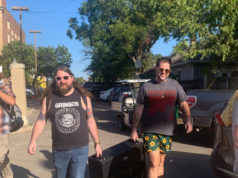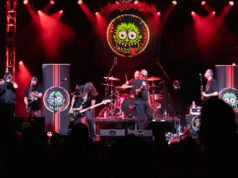0. Deletron loves bits. Our band loves bits nearly as much as we love making music. We feel that it’s fairly natural to supplement our likely outdated ’90s-worship, indie-rock musical aesthetic with a healthy dose of Camus-inspired absurdity. We will be the ones to release our first album on VHS cassette as the only physical format. None of our liner notes credits any band member by name, only their first initial and “O. Deletron” as the surname. We’ll sell random thrift store tchotchkes at shows in lieu of actual merchandise (“O. Delewares”). To “market” our band, we’ll send publications and radio stations aluminum Chinese food takeout containers filled with rubber bands as stand-in lo mein noodles nesting a thumb drive containing our music and a complimentary coin purse labeled with a P Touch™-printed O. Deletron sticker. For no other reason than to crack ourselves up, we maintain “O. Dialetron,” a multi-optioned call-in number (817-435-2706) where you can press a button to hear bits of songs, recordings of members reading from enigmatic literature, or many other, increasingly irrational nonchalance.

Courtesy the artist
We often joke that we are the most un-serious serious band in existence, because when it comes to actually making music, we still take that part of it pretty seriously.
Most of the time.
To a degree, our shenanigans are an extension of our feigned self-important “high art” approach to music creation. Goldbricking genre distinctions, we believe music should be expressive and ever-changing. Our tomfoolery is also partly born out of a nostalgia for an era when music existed in more than the digital realm and was meant to be experienced as much as heard. An element of it is an attempt to stand out among a sea of younger, hipper bands and, if honest, likely subconscious over-compensation for trying to compete with the same. But, mostly, it’s probably because we’ve just grown bored with simply playing music.
The steady stakes-increasing one-upsmanship inherent in our drollery would perhaps predictably culminate in something like our latest bit of musical theater. Because “Who else would?,” we’ve just released into the world the overripe fruits of an insane burst of creative energy in the form of the eye-popping 52-song quadruple album of mid-fi bedroom pop we’ve ridiculously decided to call Jeff.

Courtesy the artist
If we were younger, and more relevant, or skinnier and more attractive, a megalithic sonic data dump of this size might be a bit more significant. Especially considering it would run completely counter to the piecemeal single-song release methodology of most contemporary artists. Hell, if a band drops a full EP’s worth of material at one time these days it’s seen as almost as grandiose as when Guns N’ Roses put out Use Your Illusion I and II. Sure, this most recent spectacle may rightfully be viewed as our most nonsensical yet, but it’s also our most honest and artistically expressive work to date. This album is not just nonsense. Despite its scope, Jeff is the product of only a handful of arduous months of strenuous, unremitting home-recording sessions. The same care was used to craft these songs as any, albeit at a much more rapid pace. Bands can run entire careers and not write this many songs, but we didn’t do it just to say we did. There’s no fluff, no filler. These more than half a hundred songs we feel deserve to be placed together as one complete work. Jeff stands as what is possible when decades of practicing and listening to progressive music funnel themselves through the limbs of certain musicians driven with a single goal. And who have the freedom that comes with not taking themselves too seriously.
******
When you’ve cleared the hamstring-snapping high hurdle of turning 40 and you’ve spent your entire musical life in abject anonymity, it allows a certain freedom of expression. After writing and performing for decades to practically no one, you develop a certain lack of concern for accessibility and acceptability, if you ever had one to begin with (likely a large reason for the aforementioned audience of no one).

Courtesy the artist
When you are free of the yoke of expectations, frivolity is a nice surrogate to swoop in to occupy the vacuum left behind. You learn to cherish the anonymity, to lean into it and exploit it, to stretch out into the voluminous space allowed by not really having to care how your work might be received or by whom.
We’ve long ago left behind the dreams of life spent in un-air-conditioned vans filled with the sour smell of socked feet, surviving on high trans-fat gas station fare, crisscrossing the college towns of Middle America to play rooms full of angsty arms-folded outcasts. Each of us has settled comfortably into civilian careers and domesticity. We find ourselves enthusiastically embracing the warm confines of once-ridiculed creature comforts. When you’re no longer hindered by the pressures of making music a “career,” it’s easier to remember that creating music, as well as being rewarding for the soul/mind/ego and everything else, is supposed to be fun. Hell, you’ve got to try hard to continue to give yourself a reason to drag your ass to rehearsal when a comfy bed, a glass of whiskey, a warm body, and The Great British Baking Show are pulling you in the other direction.
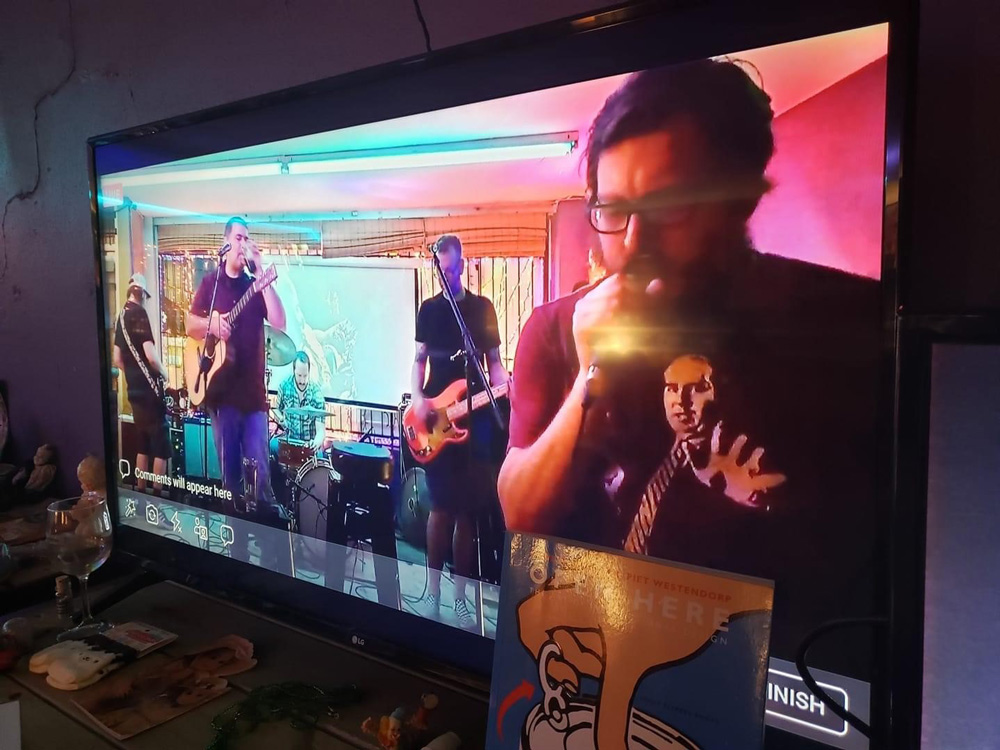
Courtesy the artist
In a way, the tomfoolery of O. Deletron has really taken on a life of its own. Like a clumsy, oafish reanimated corpse with a tender shock-started heart, we may occasionally lumber into walls, but we are still enthralled by the beauty of a daisy and try our damndest to describe it in interesting and creative ways. It doesn’t really matter that few, if any, folks beyond those of us in the band appreciate/enjoy/even understand the whimsy. A tree falling in a forest with no one to hear may or may not make a sound, but the axman who felled it still knows it happened and takes pride in his work all the same.
Jeff is an accomplishment, no doubt for its volume but also for its quality. In my many years of writing and recording music in numerous bands, this is the project I’m most proud to be associated with. It’s special to me not just because of its content but because it also serves as an emotional goodbye to a very important working relationship. In a way, Jeff is Flynn’s swan song. Er, songs.
******
Sometime last fall, I opened the band’s shared Google Drive and noticed a new document. It proved to be a Dear John letter of sorts from our guitarist, core songwriter, sometimes singer, and co-creative visionary, Flynn. “Flynn” is not his real name. He prefers to keep his musical life separate from his personal/professional one and has employed aliases in every project he’s played in for years, a different name for each. He was credited simply as “Drummer” for his work with Tame … Tame and Quiet. Whether this insisted anonymity was yet another bit, or some sincere eccentricity, I still do not know.
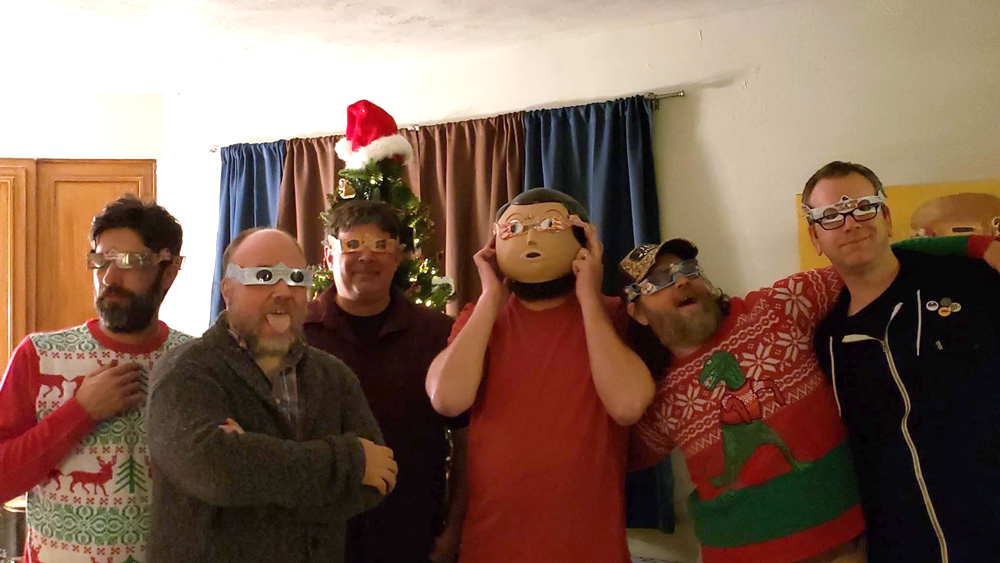
Courtesy the artist
He addressed the note “Dear Bands,” meaning not only O. Deletron but the metal outfit Ox Combine, the post-rock groups 100s and Tortfeasor, and probably a few other projects I’m completely unaware of — Flynn is easily the most prolific musician I’ve ever met or even heard of. He explained that he’d decided to accept a big career opportunity that would require going back to school, a pursuit that would take every ounce of his time and energy, and, consequently, he’d be leaving the band(s).
As is his nature, upon his decision to leave, Flynn could not go quietly into that good night. Like a cross between the debonair international jewel thief in those Steven Soderbergh films looking for one last big score before escaping to some Caribbean island and a perplexing final Andy Kaufman routine, Flynn had one last trick up his sleeve. Before his departure, he wanted to spend the next few months making one last album. Included with the letter was a folder of scratch song ideas, probably about 20 or 25 of them. It was his goal to flesh out these last songs, record them, and release the album before the start of the spring semester just a couple months away. My assumption is that he wanted to be able to confidently walk away leaving no loose threads that could have been tied. A clean severance, allowing no regrets.
Over the last three years, I’ve become fairly conditioned to Flynn’s, shall we say, “ambitious” ideas. We once went into a studio to track a double single, one song of which was completely unwritten until practically the day before the very expensive (to us) sessions. Our last proper album was a concept album in which Flynn and Aaron Bartz — O. Del’s frontman and Flynn’s co-conspirator in the group’s boundary-pushing artistic concepts — assigned the members to work in pairs. Each was to write one song and assist another member on theirs. And this album was meant to be recorded just over a holiday break. Another example is when the band was told there was a Word doc on the shared drive and we were each to add five words to it per day, just picking up where the last person left off and adding whatever came to mind with no consideration for fluidity or context. This document was intended to provide the basis for the lyrical content of our next album. Once, while working on new material for a potential EP, Flynn showed up to practice with four completely new songs he’d written in the days prior and maintained that these new songs, the so-called “pop-up EP,” would now be our focus to record instead and, of course, in just a matter of weeks. Moments of confusion and being more than a little intimidated and “Wait, we’re doing what now, exactly?” instances have been numerous.
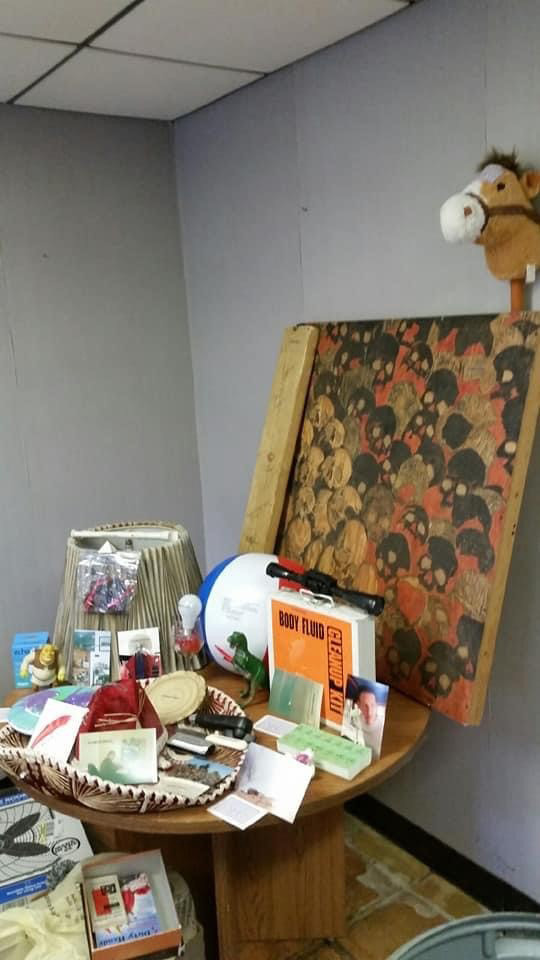
Courtesy the artist
Yet Flynn always seems to somehow have a realistic grasp of our abilities and our limits, knowing where they are and just how far he can push them. We didn’t always meet his deadlines (who could), but the work almost always got done and in some general way conformed to his initial vision. That unwritten song, “Tessellations,” was thrown together at the last second before the session and has ended up being the strongest song in our catalog, in my opinion. The duet assignment album idea became Hold Music, Vol. 1, which we released last summer, and it is not only a strange and beautiful piece of work in its own right, but the methodology we figured out in making it is really what made something like Jeff even possible. As crazy as they sound upon first hearing, we always seem to make Flynn’s ideas work. (The “pop-up EP” is one exception. COVID killed that one, though one song, “Familiar Strangers,” does appear on Jeff.)
OK, two months, 25 or so songs recorded remotely via file sharing (because of pandemic and all). Not that impossible, right?
Right?
Guitarist Jeff Williams (the album’s namesake) and keyboardist/resident digital noisemaker Tyler Walker went to work pretty fast on the songs. They started throwing things together, and more and more tracks were going into song folders by the day. Thomas Horton added some tasty piano. I tried my hand at a few bass runs. Not to be left out, drummer Ricky Del Toro simply recorded naked improvised drum parts, and Flynn and Jeff wrote completely new songs on top of his beats.
The ball was starting to roll, but the pace wasn’t near fast enough to meet the deadline. And, worse, somehow the list of songs we needed to complete ballooned from 25 to 40 and counting. It became apparent that we needed to enlist the help of others outside of O. Del proper.
Flynn started by recruiting members of his various other bands. Then help from musicians not directly tied to the O. Delaverse began to contribute. Some offering their talents to existing songs, others adding yet more new songs to the pile. Every day, there were new surprises waiting in the files. New riffs, new words, new songs.
Instrumentation was not a problem. Many players were available, but vocals were starting to lag and Bartz was only one person, so Flynn sent the Bat Signal for singers, and suddenly more and more voices started appearing over the songs — their words mostly derived from that silly improvised Word doc. From all the way in Oregon, our friend Scott Witt (The Energetics, The Ways and Means) lent his voice to several tracks. Daron Beck of Pinkish Black sang a tune. Chris Flemmons of the Baptist Generals took a few turns. Cameron Smith (Sur Duda, War Party) helped write and sing a pair of songs as well. Darren Miller (Tame … Tame and Quiet, Annafell Lights) ended up playing on more tracks than I do, probably. All told, I believe eight different vocalists (including Cameron Smith’s dog) appear, and 20 total musicians played on the album. I still have only a loose comprehension of who did what and when. The end result has been as crazy a journey of discovery for me as for any listener.
To keep track of the madness, we had to use a spreadsheet listing the songs with what instruments were already recorded and which were still required. For the most part, that helped keep things organized and in perspective. The whole eating an elephant one bite at a time and all. There were times when a particular part was laid over others and clashed with something else or changed the feel of a track in a weird/unforgiving way and had to be tossed, but mostly everything just worked. Sometimes even different options fit equally well. For instance, somehow in the confusion, the song “Break” accidentally ended up with two separate bass tracks from two different players. Each of them worked in different ways. Rather than have to choose which one, we decided to simply cut the baby in half, so to speak. The song is now broken into two parts and bookends the album with one bass line version as the opening track and the other as the closing.
It took longer than planned (by about three months), but as we always seem to manage to do, we ended up making Flynn’s whacky vision a reality.
With so many cooks, it would be easy to imagine a directionless and disjointed result, but, amazingly, despite the half-dozen different voices, the half-hundred songs tend to drift all over the sonic map in a cohesive way. The styles shift from straight indie-rock to Beatles-esque pop to morose Spaghetti Western and dreamy synthwave, danceable electronica, and even unashamed goth rock. The myriad sounds still seem like they sprang from one unified hive-mind.
At two and a half hours long, it’s certainly a journey (so long, in fact, it requires breaking into separate volumes to be uploaded to the major streaming platforms).
Unnecessary? Maybe. Self-indulgent? Probably. Artistically gratifying? Definitely.
Do we expect that many will appreciate it? Or make their way through even half of it? Probably not. But we anonymous axmen still know the pride of our work just the same.
******
Just last week, I did something that used to be routine but that I hadn’t been able to do for nearly a year and a half. For the first time since before the zombie apocalypse, I played music with my friends. We dragged (“drug”?) our gear up to our new rehearsal spot, bathed ourselves in its harsh halogen overhead lighting while absentmindedly banging on several of its included retail store-sized selection of various hand drums, set up, and proceeded to fight through a few various approximations of recognizable songs.
It was a great feeling.
Despite the roughness of the playing and the soreness in my pathetically soft and under-used fingertips, just being around those guys and making sound bounce off the plaster walls again was as calming and centering as it’s always been.
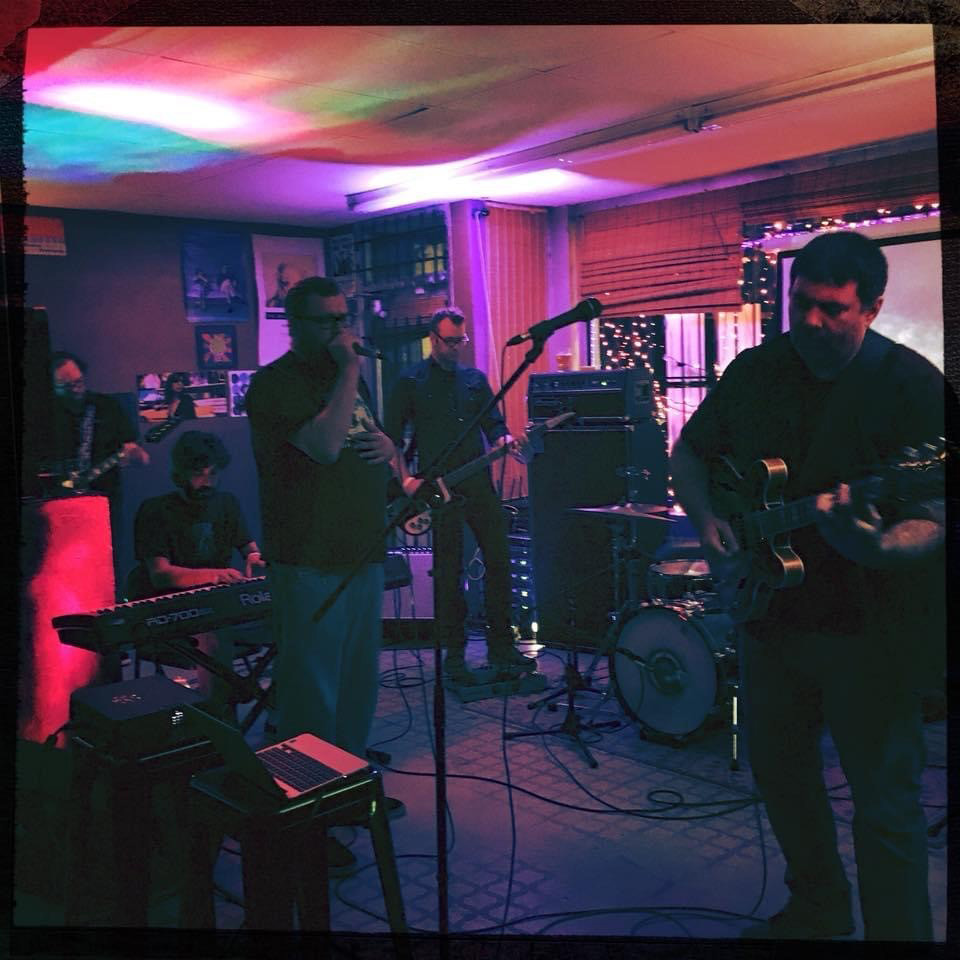
Courtesy the artist
But it was different. Not just because of how long it had been since the last time we’d played or due to the new, foreign practice environment. It was different in that, not only was there a new drummer behind the drum kit (welcome, Nick Kelly) as Del Toro left to focus on his main band BULLS, but for the first time ever, O. Deletron was without its de facto leader.
As a bloated, extravagant affair, O. Deletron has (had) seven (!!) original members. (Unless you’re Keith Emerson, two keyboard players are better than one.) With such a large lineup, and with the myriad competing obligations that come with our station in life — other bands, work, wives, kids, laziness — it has historically often been difficult to get everyone in the same room for rehearsal every week. Over the last couple years, every individual has missed multiple practices. Everyone except Flynn. No Flynn, equal sign, no practice. So last week was doubly weird.
Despite sounding like a Bradbury-ian sci-fi robot’s moniker, our band’s name is actually derived from a species of squid. Octopoteuthis deletron — abbreviated O. deletron per scientific convention — lives 2,000 feet below the surface of the Pacific Ocean. It’s known for its peculiar defense mechanism. To evade predators, it will hook one of its limbs into the skin of its assailant, detach that limb, and jet away, forfeiting a piece of itself to ensure the survival of the whole.
The obvious metaphor in this context is too on-the-nose to even entertain.
Without Flynn, it’s not just that our ship is missing its captain — each of us is capable of taking up the epaulettes and directing course. We’re well experienced playing together. Though O. Del is only three years old, some working relationships go back 20-plus years.
No, without Flynn, it’s almost as if we are missing the ship itself.
It’s much like when Roger Waters left Pink Floyd. Well, it would be if Floyd was an almost burned-out unknown band, well beyond their prime, drowning in a sea of more relevant and appreciated artists and wasting away in a little rhinestone cowboy town in Texas. But all the same, it’s the creative heart and soul of a band now absent.
Now that Jeff is out and “Flynn is dead,” O. Deletron will have to think hard about what exactly our next caper will be. The surviving members will just have to tread water for a bit while we try and figure out how to make a new ship from the driftwood floating by. We’ll no doubt manage to cobble something together. It’ll be interesting to see how she sails.





